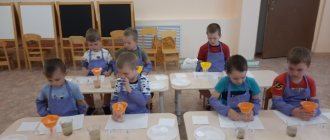Poems about volcanoes
Poems about volcanoes are another way to learn information about volcanoes in rhythm and rhyme.
* * *
Volcanoes began to “volcano” - spew lava from their craters. Lava flowed down the slopes and severely burned the Earth. Centuries later, the evil Vulcan coughed up both ash and ash. The volcano is thundering! The volcano is chugging! How menacing he looks now! But then he began to get tired - The fire in him began to fade. He breathed fire for the last time - And fell asleep for decades. Centuries will pass... And again the volcano will wake up, And lava will flow from its interior.
* * *
Here the volcano is a mountain, and inside the mountain there is a hole. Smoke is coming from the mountain, stones are flying, gray smog. There was a rumble here and there: a volcano was awakening. The whole mountain trembled, Magma ran like lava, Stones and ashes flew, The sky was barely visible. Don’t go, my dear, where the awakened volcano is.
Andreeva-Doglyadnaya M.
* * *
The volcano stands in the middle of the desert, is silent, does not breathe, does not creak, but only underground, in the depths, He melts the earth, stirs up.
Already in the depths of the magma is boiling, fire is moving through the crater, and everything is burning, the old, ancient stench of anger does not disappear.
The magma boiled for a long time, rushing upward, to smash, to destroy; The time has come for rage to destroy and demolish everything.
You can see the stone crumbling - A terrible panel from hell - The sky has become dark blue: It will be gloomy forever.
Finally, a flame erupted, a river flows through the volcano, Lava gives the mountain an ornament, and it all becomes red.
The stream has cooled for miles. The apogee has long been asleep and stands, neither alive nor dead, but this volcano is extinct...
Beregovsky D.
* * *
Vesuvius opened its mouth - smoke poured out in a cloud - the flames developed widely, like a battle flag. The earth is agitated - idols are falling from the shaky columns! The people, driven by fear, Under the rain of stones, under the inflamed ashes, In crowds, old and young, flee from the city.
Alexander Pushkin
What is a volcano and why is it called that?
Once upon a time in Ancient Greece there lived a god, and his name was Hephaestus. He was not famous for his beauty, he was lame, but he had a steely character, strength, and was very successful in blacksmithing. It was he who curbed fire and subsequently taught people how to make it.
Hephaestus lived and worked in his own forge, which he himself made inside the mountain. People said that if there is steam and fire above the mountain, then Hephaestus has begun his work. People were afraid. And they called Hephaestus the god of fire Vulcan, and his dwelling also began to be called Vulcan.
But this is just a beautiful legend. The word “volcano” itself comes from the Latin “vulkanus” and is translated as “fire”. In fact, a volcano is a rock formation on the surface of the earth with a huge hole on top, called a crater, from which magma periodically emerges, which becomes red-hot lava, spreading mixed with huge stones and surrounded by clouds of ash. Magma is liquid rock from underground. And lava is what magma turns into when it gets out and loses water and gas vapor.
How does a volcano work? Why does it erupt?
Usually, a volcano looks like a mountain in appearance; it is also in the shape of a cone or pyramid. Only here on top there is a huge hole down to the base, which is scientifically called a crater or vent. If suddenly somewhere the earth’s crust has a crack, then magma has every chance of getting there and pouring out through the mouth of the volcano. The emergence of a volcano is due to the fact that the earth moves and changes, and the composition of substances at depth also changes. The process is called an eruption.
Imagine a bottle of Coca-Cola that you shook and then decided to open the cap. There will be a pop, smoke will appear, and then foam. The thing is that so-called degassing occurs, and the liquid literally explodes. A volcano works on the same principle. But unlike foam, hot lava is very dangerous for humans. It can spread in different directions for many kilometers around. The action can last several hours or even several years. Lava destroys everything in its path, and gas clouds easily cause suffocation attacks in people and animals. It is almost impossible to hide from the eruption. The best way to escape is to evacuate in time.
Volcanoes can erupt in different ways. Some explode violently, then magma is thrown to a height, and then the red-hot lava spreads at an incredible speed in all directions. At the same time, the space around is shaken by a terrible roar, and a huge column of smoke rises around the volcano. And other volcanoes erupt quietly and calmly.
Volcanoes are active, dormant and extinct. Active volcanoes are the eruptions of which humanity remembers. The ones that fell asleep are those that did not erupt, but have every chance. Extinct - those that have not erupted for many thousands of years or have been destroyed. There are approximately 1,500 volcanoes on our planet, of which about 600 are active.
A volcanic eruption is a scary thing. However, it's not all bad. There is some benefit from this terrifying phenomenon that we cannot stop. For example, along with lava flows, minerals and hard rocks come to the surface, which are then used in construction, as well as metals necessary for industry. Pumice is also what the volcano gives us. And ash from a volcano is an excellent natural fertilizer for plants.
Riddles about volcanoes
Volcano riddles for children are a simple and fun way to reinforce information about volcanoes. They will help you remember the features and signs of this unique natural phenomenon.
Where fire flies from the mountain, And smokes from all sides, There is a dangerous hooligan, Awakened again... (Volcano)
I spit fire and lava, I am a dangerous giant, I am famous for my evil reputation. What is my name... (Vulcan)
Grandfather Trofim smokes, smokes, and blows smoke into the sky. But as soon as he coughed, fire rushed into the sky... (Volcano)
That rather large mountain has a quiet character for the time being. But this can happen - It will explode, smoke... (Volcano)
The mountain woke up from sleep, began to seethe and boil. And a lot of smoke, soot, and ash rose up from the cap. The lava flows like honey, thick. How to name a mountain like this... (Volcano)
I am a black scary giant. I decide for myself what to do. I can sleep, I can growl, I can spew fire and ashes. Well, try to guess what my name is... (Volcano)
When he sleeps, everything is calm, but if he wakes up, there will immediately be thunder and an earthquake. It also brings destruction. (Volcano)
There is a natural phenomenon called an “eruption”. Lava flows from the mountain, Ash blows and blows in the sky. Tell me now, Who is the culprit of these affairs? (Volcano)
The mountain is smoking, smoking, Ashes are blowing into the ocean, You can hear the mountain snoring, Don’t wake up! Sleeping...(Volcano)
There is a hole at the top. It's hot inside! Sometimes it releases lava. Find justice for her... (Volcano)
A hurricane of a hot and evil disposition soared into the sky: Having uncorked a jug from a stone, molten lava poured down and swirled poison in the air, an angry gray-haired... (Volcano)





